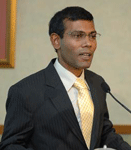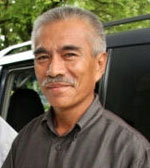
A Sea of Change for Island Nations

Mohamed Nasheed, President of Maldives
On Saturday, Maldives President Mohamed Nasheed will lead a cabinet meeting underwater. The unusual choice of location is to practice for later in the century when low-lying Pacific Island nations will find themselves inundated, thanks to the impacts of climate change. The political leaders of these countries know they don't have the luxury of seeing global warming through rose-colored glasses. Without action, the almost 9 million citizens of these island nations will be swallowed up by the sea.
Conservative estimates of sea level rise over the next century promise “disproportionately great effects” for island states. Some are expected to disappear by the end of the century. Others may not disappear, but rising sea levels will create severe environmental problems that may make them uninhabitable. But as demonstrated by Nasheed, the leaders of these nations are not going down without a fight. One leading voice is President Anote Tong of Kiribati. Tong knows that his country’s citizens “will have to face up to the reality of their islands being unable to support life,” possibly in as little as 50 years from now.

Anote Tong, President of Kiribati
Tong has proposed a reasonable and practical solution: relocate the people of Kiribati around the globe. There are tremendous logistical, legal, and cultural downsides to the plan, but Tong remains clear-eyed in his focus—the most important thing is to guarantee the survival of his citizenry.
His solution has entailed long-term planning and, more importantly, a training program for residents. He hopes to identify skill needs in international labor markets and then provide intensive job training to his citizens.
Despite President Tong’s stumping, Kiribati has only sent about 525 residents to New Zealand since 2002 and trained some nurses through the Kiribati-Australia Nursing Initiative. These numbers are a small start, given that 100,000 people need to be relocated within 50 years. Even if all I-Kiribati are successfully relocated, there are 15 other low-lying island nations with almost 9 million residents in the same boat.
Most countries are resistant to serving as receiving nations, citing such excuses as threats to security, illegal immigration, and people smuggling. And of course, ethnocentrism and racial prejudices are always factors.
But the downsides of immigration are hardly the entire story. There may be some interesting economic incentives to host countries which will be the focus of an upcoming report from the Institute for Policy Integrity at NYU’s School of Law.
In the meantime, Nasheed and his cabinet are wise to train with their scuba-gear and practice with waterproof pens. Citizens of island nations are the human canaries in the mine shaft of climate change, and while they may feel the effects sooner and more harshly than other nations, their plight should remind others that the physical, economic, and geopolitical risks of global warming are real.
Congress may not need to hold its sessions in the Potomac yet, but it would be wise to move ahead with climate legislation soon.
Inimai M. Chettiar is a Legal Fellow at the Institute for Policy Integrity (IPI) at NYU School of Law focusing on environmental and public health advocacy and scholarship.
Posted by Inimai M. Chettiar on Oct 14, 2009